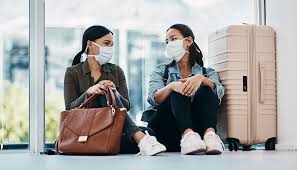If you are traveling during COVID, here are some travel tips you need to know. First, don’t be in close contact with people who are sick. Also, don’t travel with unvaccinated kids. If you’re traveling with children, get them vaccinated as soon as possible.
Avoid close contact with people who are sick
When traveling during COVID season, it is important to follow the recommended personal protection measures. This means staying at least six feet from those who are sick. It is also important to stay away from crowded places and poorly ventilated areas. You should wash your hands often and use hand sanitizer with at least 60% alcohol. In addition, you should make sure to clean frequently touched surfaces with soap.
Getting tested before you travel is one of the best ways to lower your chances of spreading the COVID-19 virus to others. The CDC recommends getting a viral test three to five days prior to traveling. If you are unsure about the results, delay traveling or get a second test three to five days before you travel. If you do get sick, you should stay at home for at least five days after traveling and avoid close contact with others.
Avoid traveling with unvaccinated children
Experts warn against traveling with children who are not fully vaccinated during the covid epidemic. There is still a risk of the virus spreading to unvaccinated children, even if the destination is a safe one. The risk varies depending on the coronavirus circulating in the destination and the vaccination status of local residents. Children fully vaccinated with a COVID-19 vaccine are not at risk of being infected, but if they come into contact with unvaccinated people, they could end up carrying the virus home with them.
While most countries require a child to have an up-to-date vaccination record, some have relaxed the vaccination rules for children under the age of 12. Some countries, such as Iceland and Antigua, have waived vaccination requirements for young children if they have proof of a negative coronavirus test. If you are traveling with your children, be sure to mask them and take precautions to prevent them from being exposed to the disease.
Packing for travel
Despite the fact that the rates of COVID infections have dipped significantly, it is still a very common disease and the best way to stay safe is to stay vaccinated. Although the use of masks and strict vaccination requirements have been lifted in many places, about 400 people die every day from the disease. When you’re traveling far from home, it’s even harder to avoid becoming sick, especially when there are no medical facilities nearby. Using a travel checklist is an excellent way to stay well-prepared.
To prevent travel-related illnesses, be sure to pack hygiene and sanitation supplies, such as hand sanitizer, soap, and toothpaste. You should also pack a roll of toilet paper.
Getting vaccinated
COVID is an infectious disease that can cause a severe illness, including death. Vaccines for COVID-19 are available in the United States. Two kinds of COVID vaccines are currently in use: the messenger RNA vaccine and the viral vector vaccine. These vaccines have been tested extensively in animal trials. They are relatively new and the long-term safety and effectiveness of these vaccines are unknown. Still, getting vaccinated against COVID is your best bet.
There is a very small risk of contracting the disease after getting vaccinated. However, if you’ve been exposed to the disease before, you should wait at least three months before getting vaccinated. This will give your body time to build immunity.
Getting a test
Getting a COVID test before traveling is a good idea to reduce the risk of transferring the disease to others. Ideally, you should have your test performed at least three days before leaving. If you are unable to do so, it is advised that you postpone your trip and get your test done at a later time. If your results come back negative, you should continue traveling.
If you plan to travel abroad, getting a COVID test will be especially important during long-haul flights. Most airlines will offer this service free of charge. However, you should contact your airline to make sure they offer this service. In addition, you should consult with your destination’s public health authority for any specific requirements.
